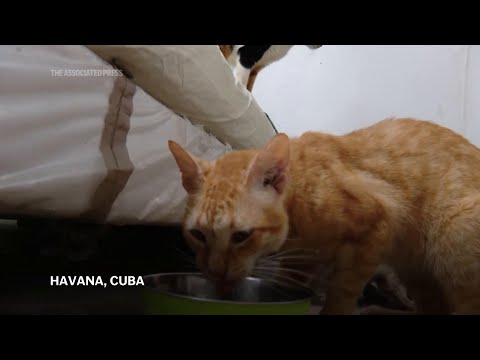(13 Oct 2024)
RESTRICTION SUMMARY:
ASSOCIATED PRESS
Havana, Cuba – 04 October 2024
1. Various of animals eating
2. “Adoptions for Love” founder Elizabeth Meade at her shelter feeding animals
3. Animals resting on a bed
4. SOUNDBITE (Spanish) Elizabeth Meade, founder of the group “Adoptions for Love”:
“Many people call us by phone asking us to take in their pets because they are going to emigrate. Suddenly, it can be a week, two days or less in advance. Because many times they hadn’t planned who was going to take care of the pet, or who was going to keep them permanently.”
ASSOCIATED PRESS
Havana, Cuba – 06 October 2024
5. People holding kitten
6. Woman carrying puppy for adoption standing next to her mother, UPSOUND (Spanish): “Puti, you’re not going to be alone anymore.”
7. Animal shelter volunteer Maripaz Álvarez talking to potential adopters
8. Woman carrying her adopted puppy
STORYLINE:
Animal shelters in Havana have reported a significant increase in the number of cats and dogs abandoned because of the economic crisis and people leaving the island to find a better future.
There are no official figures on how many pets have been left to fend for themselves in recent years.
But more than half a dozen animal activists consulted by The Associated Press agreed that there has been a noticeable increase, overwhelming the few under-resourced shelters.
Animals wandering the streets looking for food have become a common sight.
Animal-loving neighbors do their best to keep the street animals fed, but the economic crisis is making it harder for everyone to have enough food left over to share with cats and dogs.
“They call us on the phone to ask us to take in their pets because suddenly they are going to emigrate and at the last minute they have nowhere to take the animal,” veterinary technician Elizabeth Meade says.
Meade is the founder of a group called Adopciones por Amor – or Adoptions for Love – which is supported through donations.
The economic crisis, unleashed in 2020 due to the COVID-19 pandemic and exacerbated by U.S. sanctions, has provoked a migratory wave of islanders.
Between October 2021 and September 2024, U.S. border authorities reported more than 600,000 encounters with Cuban migrants, in addition to those who settled in Spain or Latin American countries.
This is not a negligible figure for an island with a population of some 10 million inhabitants.
For many Cubans, taking their pets with them is not an option.
The transfer of an animal from Havana to Miami in the United States can cost about $1,200, and since September, pet owners have to pay an additional $1,300 to comply with a legal obligation of a quarantine.
And caring for a pet on the island can be prohibitive for most Cubans.
While the average monthly salary in the state sector – the largest employer – is about $21, a 44 pound (20 kilo) bag of imported dog food can cost up to $70 and a visit to the vet costs the equivalent of $10.
Every Saturday in Old Havana, shelter workers set up stalls for an adoption fair in the hope of finding homes for at least some of the pets in their care.
Such stalls multiplied in recent years in other municipalities in the capital and the provinces, and all promoting responsible adoption and sterilization.
Activists, however, warn that this is not enough and demand more state action.
“Abandonment is the worst form of animal abuse,” dog trainer Leandro Valdés explains.
AP video shot by Osvaldo Angulo and Milexsy Durán
===========================================================
Find out more about AP Archive: http://www.aparchive.com/HowWeWork
Twitter: https://twitter.com/AP_Archive
Facebook: https://www.facebook.com/APArchives
Instagram: https://www.instagram.com/APNews/
You can license this story through AP Archive: http://www.aparchive.com/metadata/youtube/a3fcde26258d41559a4a80fb2bbe7e74
Author: AP Archive
Go to Source
News post in October 18, 2024, 3:04 am.
Visit Our Sponsor’s:
News Post In – News





